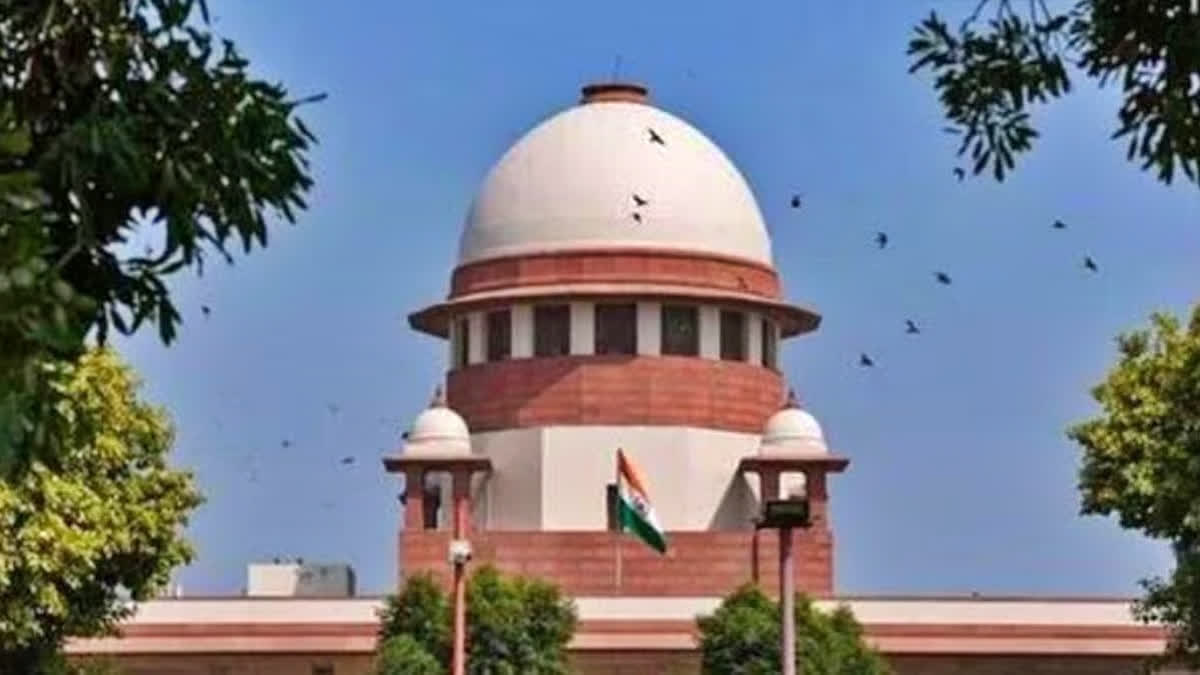New Delhi: The Supreme Court on Thursday asked a 26-week pregnant woman to reconsider her decision to terminate the pregnancy and carry the pregnancy for a few more weeks so that the child isn't born with any deformities. A bench led by Chief Justice of India DY Chandrachud and comprising justices JB Pardiwala and Manoj Misra, during the hearing, stressed that there are rights of the unborn child, too, and woman's autonomy is important of course. The bench said she has a right under Article 21, but equally, “We must be conscious of the fact that whatever is done will affect the right of the unborn child."
The bench told the petitioner’s counsel, “Who is appearing for the unborn child? You're for the mother...how do you balance the rights of the unborn child? It's a living viable foetus. Today its chances of survival are there….”. The Chief Justice asked the petitioner’s counsel to advise his client to wait for a couple of weeks more, and questioned, is putting the child to death was the only option. How can the child be put to death under judicial order? The petitioner's counsel said his client does not want to stop the heartbeat of the child and also does not want to go through the full term of the pregnancy.
The Chief Justice said, “Let put this very bluntly, either we kill the child, or we ensure that the child is delivered in a state that the child is born to be formed deformed, and deformed for life. We can’t kill the child...of course, in a given case we will still exercise that overriding discretion. A child, who has been subjected to child sexual abuse. A girl, who does not know that she was subjected to forcible intercourse…the judges’ task is all about balance. Balancing rights, balancing duties, balancing what is in social good. I find it very difficult to come to terms with this order actually…”.
Also read: 'Caste can't be used to show leniency in child sexual assault case': SC
The Chief Justice said, “Today if the child is delivered deformed, nobody will adopt the child. In our country people do not like to adopt children with special needs, that is a very hard fact. Occasionally there are exceptions, but generally, people don’t in our country. But the fact of the matter is that the child will have nobody, no source of succour…..”. Petitioner’s counsel said the same thing will happen with his client, she is unable to take care of her two children and her mother-in-law is taking care of her children now, and it is not feasible to take care of the third child and the petitioner’s life will also be spoiled. The counsel stressed that after the delivery of the third child, two lives will be spoiled.
The Chief Justice asked the petitioner’s counsel and additional solicitor general Aishwarya Bhati, representing the Centre, to talk to the petitioner today and the court will again hear the matter tomorrow, and “we will not do something, which is knee jerk or pass any order, just because of our prima facie observation. Talk to your client…”.
The counsel said if this case had been of a minor girl or an unmarried girl who came to the court then this question of foeticide would not have arisen here. “It depends”, said the Chief Justice. The counsel said his client is married. The Chief Justice said, “does not that make a critical difference? A child of 14 years is raped and she conceives….”. The counsel cited a high court judgment ordering the termination of 29-weeks pregnancy. “I know, but we are the Supreme Court”, said the Chief Justice, concluding the hearing.
Also read: 'Marriage still pious, spiritual life net': SC refuses to grant divorce to octogenarian couple
On Wednesday, two women judges of the Supreme Court disagreed on whether to allow or not the termination of a 26-week pregnancy of a married woman, who was earlier allowed by the court to abort it. The case was placed before the Chief Justice of India DY Chandrachud for the constitution of a larger bench to decide the issue.
A bench comprising justices Hima Kohli and BV Nagarathna said one of us (Justice Kohli ) thinks that the pregnancy should not be terminated, whereas the other judge on the bench disagrees. Justice Nagarathna, dictating her part of the order, said “I respectfully disagree...the petitioner has stated throughout that she does not wish to carry out her pregnancy."
Justice Nagarathna said this is not a question where the viability of the foetus has to be considered, but the interest and wishes of the petitioner, who has reiterated her mental condition and ailments, and the petitioner’s decision must be respected.
On October 9, the apex court allowed the woman, a mother of two, to proceed with medical termination of pregnancy after taking note that she was suffering from depression and was not in a position to raise a third child, emotionally, financially and mentally. The apex court was hearing an application filed by the Centre seeking to recall its order.



